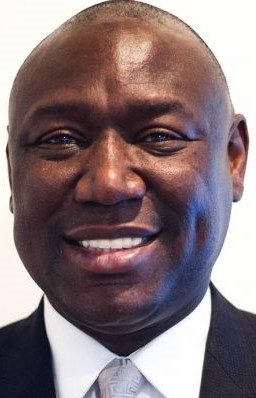
Black lives have always had a price; Floyd case brought new accountability

EDITOR’S NOTE: The following column is republished with permission from USA Today network, which first published it on July 7. The original version can be found on line at https://www.usatoday.com/story/opinion/policing/2021/07/07/ben-crump-george-floyd-derek-chauvin-case-new-era-accountability/7824503002/
Derek Chauvin’s 22.5-year prison sentence for the murder of unarmed Black man George Floyd should not have been historic. But it was. After so many Black lives have been wrongly extinguished at the hands of police with no consequences, we have real punishment. This could represent a true turning point: Instead of a cover-up, we have consequences. Instead of deniability, we have accountability. Instead of apathy, we have action. It’s long overdue recognition that Black lives have intrinsic value. From the moment Black people stepped off slave ships and on to American soil, we had a price tag on our heads. It wasn’t our real value. That is a precious, inestimable value endowed by our maker. It was the value assigned to Black people as the property of an owner, as a source of labor, and as a means to produce more labor for the future by bearing children. To those who brought us here, our worth came only from our work, as we spent the whole of our lives in fields, doing back-breaking and inhumane labor, finding solace only in praising the Lord with our brothers and sisters. Emancipation liberated us from the confines of literal slavery, but it failed to ensure that the value of Black lives would be recognized by individuals and protected by institutions of government. Too often, Black life is treated as disposable, and those who threaten or end it face little or no consequence. How do we correct that? Changing hearts and minds is a lengthy, stubborn and often fruitless process. But the American justice system offers remedies –criminal justice, which applies a punishment for taking a life, and civil justice, which attaches a monetary value for lost life. Of course, putting Chauvin behind bars for two decades doesn’t equate to full justice. It doesn’t give Floyd his life back. And no amount of money can make up for the loss of a human being. But both remedies are critical forms of accountability, and both can drive change. If officers know that they may have to live out their days in prison for wrongly killing a Black person, rather than getting the unquestioned benefit of the doubt, they will conduct themselves more responsibly. And if municipalities and police departments have to pay large settlements or judgments for faulty procedures that imperil Black lives, they will change toxic police cultures, root out bad cops and begin holding them accountable. The $27 million settlement paid by the city of Minneapolis in Floyd’s death was among the highest pretrial settlements in the death of a Black man at the hands of a White law enforcement officer in American history. The $12 million settlement paid by the city of Louisville to the family of Breonna Taylor was among the largest settlements for the death of a Black woman at the hands of the police in American history. Most recently, the city of Columbus settled with the family of Andre Hill for $10 million, which is the largest settlement ever to be paid by that city. Multimillion dollar civil settlements have the potential to overcome entrenched and powerful police unions, government apathy and political opposition to drive lasting and long overdue police reforms. The advent of body-worn cameras and smartphones has ushered in a new era of transparency. What long was hidden now is often recorded and visible, making it harder for police to shape false narratives that blame the victim and allow officers to evade accountability. And the police culture enabling that killing will be exposed to a national spotlight and come under microscopic scrutiny, exposing the flaws in its training, policies and protocols. The overdue degree of criminal and civil accountability in the wake of Floyd’s death was jet-fueled by the thousands of people who raised their voices and demanded justice. We need those voices to remain engaged to avoid what Minnesota Attorney General Keith Ellison calls “the cycle of inaction” on police reform, during which a study is done and recommendations are made but nothing actually changes. In response to sustained citizen outrage over Floyd’s death, at least 30 states have passed meaningful police reforms, including banning or limiting neck restraints and imposing a duty to intervene on officers who witness bad police behavior. Many municipalities across the country have gone further, implementing de-escalation training and adopting procedures that reduce the use of force. Now, we need the Senate to finally do its part and pass the George Floyd Justice in Policing Act to transform policing from coast to coast and protect Black lives as other citizens are protected. Floyd’s death brought a wave of consequences that is sadly unusual in the death of a Black man at the hands of police. We must ride that wave to achieve lasting change that ushers in a new era of accountability.
Ben Crump is a civil rights attorney and founder of the national law firm Ben Crump Law, based in Tallahassee, Florida. He represented the Floyd family in its civil suit against the city of Minneapolis.







